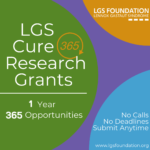2020 Grant Recipient – Jennifer Kearney
 RNA Modulation in KCNB1 Model of LGS
RNA Modulation in KCNB1 Model of LGS
Jennifer Kearney, PhD
Northwestern University Feinberg School of Medicine
Highlights:
- Evaluated mouse model with a Kcnb1-associated LGS mutation.
- Applied antisense oligo to knockout mutant Kcnb1.
- Assessed neurological and behavioral symptoms in Kcnb1 LGS mice following ASO treatment.
Results:
This work focused on identifying and optimizing gene therapy for a known LGS gene, KCNB1. Anti-sense oligonucleotides (ASOs) were evaluated for allele-specific downregulation of the G379R allele of Kcnb1 in a way that exhibited RNAse H activity that is high for the G379R mutation and low for wild-type Kcnb1. Validated ASOs then advanced to screening in primary neuron cultures from Kcnb1R/+ mice. Because of this work, the investigators made progress in advancing possible gene therapy for LGS patients with KCNB1 mutation, and in vivo studies to evaluate the effect of the downregulation of Kcnb1 in mice are underway.
Dr. Kearney and her team published the following paper on these results:
Epilepsy and neurobehavioral abnormalities in mice with a dominant-negative KCNB1 pathogenic variant
Lay Abstract:
Lennox-Gastaut Syndrome (LGS) is a severe pediatric epilepsy syndrome that accounts for 1-4% of childhood epilepsies. LGS includes a characteristic EEG pattern, some degree of cognitive impairment, and multiple seizure types that respond poorly to available treatments. Novel therapies are needed to both better control seizures and improve non-seizure outcomes. Up to 35% of LGS cases have no obvious cause and are presumed to result from a genetic mutation. Heterozygous mutations in KCNB1 have been identified as a genetic cause in some patients with LGS. In genetic disease resulting from a heterozygous mutation, the individual has one good copy and one bad copy of the gene. A major unanswered question for KCNB1-associated LGS is whether the disease results from one good copy being not enough or from the harmful effects of the bad copy. Based on our current understanding, we think that the bad copy exerts harmful effects and poisons the residual function of the good copy.
To formally investigate this, we will use a mouse model with a Kcnb1-associated LGS mutation and evaluate the effects of suppressing the expression of the bad copy using an antisense oligonucleotide (ASO). The ASO will promote specific degradation of RNA from the bad copy, while RNA from the good copy will be preserved. If we see improvement in neurological and behavioral symptoms in ASO-treated Kcnb1 LGS mice, it will provide evidence that the harmful effects of the bad copy are responsible for the disease. Addressing this critical gap in our knowledge will improve our understanding of KCNB1-associated LGS and pave the way for the development of RNA-based disease-modifying therapy.
 The LGS Foundation accepts unsolicited proposals year-round to seed new basic, translational, and clinical research projects on LGS. Projects may be funded at the $25,000, $50,000, or $75,000 level.
The LGS Foundation accepts unsolicited proposals year-round to seed new basic, translational, and clinical research projects on LGS. Projects may be funded at the $25,000, $50,000, or $75,000 level.
Updated 01/09/25 (KK)

